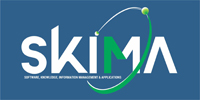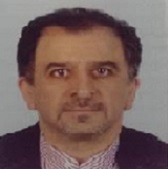3-5 Dec 2018, Phnom Penh, Cambodia

Visible Light Communications for Smart Environments
-
Professor Zabih. Ghassemlooy
Professor Zabih. Ghassemlooy received the B.Sc. degree (Hons.) in electrical and electronics engineering from Manchester Metropolitan University, Manchester, U.K., in 1981, and the M.Sc. and Ph.D. degrees from the Institute of Science and Technology, Manchester, University of Manchester, U.K., in 1984 and 1987, respectively. From 1987 to 1988, he was a Post-Doctoral Research Fellow with City University, U.K. 1988 he joined Sheffield Hallam University as a Lecturer, becoming a Reader in 1995 and became a Professor in optical communications in 1997. 2004 joined the University of Northumbria (UNN), Newcastle, as an Associate Dean (AD) for research with the School of Computing, Engineering, and Information Sciences, and from 2012 to 2014, he was AD of Research and Innovation, Faculty of Engineering, UNN, UK, where he currently is Head of the Northumbria Communications Research Laboratories. In 2001 he was awarded the Tan Chin Tuan Fellowship in Engineering from the Nanyang Technological University in Singapore. 2016 he become a Research Fellow at the Chines Academy of Science, and since 2015 has been a Distinguished Professor with the Chinese Academy of Sciences, Quanzhou, China. He is a Visiting Professor at the University Tun Hussein Onn Malaysia, Malaysia (2013-2017), and Huaqiao University, Quanzhou, China (2017-18). He has published over 780 papers (307 journals and 6 books), over 93 keynote and invited talks, and supervised over 60 Ph.D. students. Research interests include optical wireless communications, free space optics, and visible light communications with funding from UK research Councils, EU, and industries. He was the Vice-Chair of EU Cost Action IC1101 (2011-16). He is the Chief Editor of the British Journal of Applied Science and Technology and the International Journal of Optics and Applications. He is the fellow of the IET, a senior member of IEEE, a senior member of OSA, and UK Charted Engineer. He is a co-author of a CRC book on “Optical Wireless Communications – Systems and Channel Modelling with Matlab (2012); and co-editor of four books including the Springer book on “Optical Wireless Communications – An Emerging Technology (2016)”, CRC book on “Visible Light Communications: Theory and Applications, CRC June 2017”, IGI Global book on “Intelligent Systems for Optical Networks Design: Advancing Techniques, 31 Mar 2013, and IET book on “Analogue Optical Fibre Communications, IEE Telecommunication series 32, 1995”. From 2004-06 he was the IEEE UK/IR Communications Chapter Secretary, the Vice-Chairman (2004-2008), the Chairman (2008-2011), and Chairman of the IET Northumbria Network (Oct 2011-2015). Web site: http://soe.northumbria.ac.uk/
ocr/people/ghassemlooy/ Title: Visible Light Communications for Smart Environments
Abstract: There is currently a global trend throughout the developed and developing world to be more energy efficient, and the consumers are demanding energy efficient and environmentally friendly technologies as part of the future smart environments. Light emitting diodes (LEDs) and organic LEDs are replacing the existing inefficient lighting infrastructure in almost all areas of life. Such lighting sources offer much higher illumination efficiency, a longer life span, lower power consumption and low cost compared to the traditional lights. In addition to lighting applications, the LED based lights can be used for indoor and outdoor wireless data communications, i.e. visible light communications, indoor localization and sensing in a range of applications. Visible light LEDs and OLEDs can be switched at sub-micro-seconds rate, which is too fast for the human eye to react but not for a special sensor on our portable digital devices. Thus, paving the way for the use of visible light LEDs with multiple features in smart environments. This talk will give an overview of this emerging visible light communications (i.e., LiFi) technology highlighting technical challenges and solutions for the LED and OLED lighting and data communications techniques.













